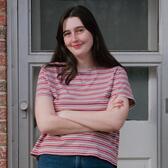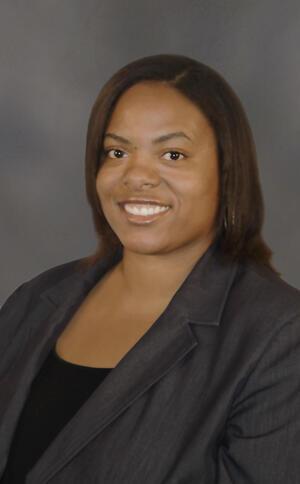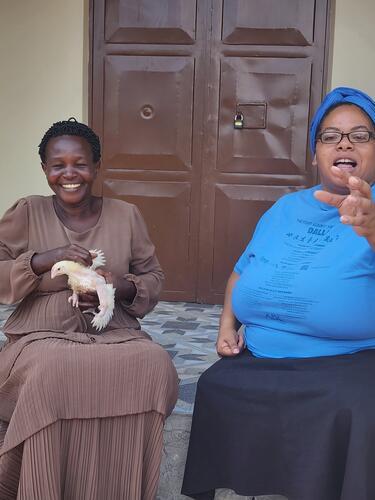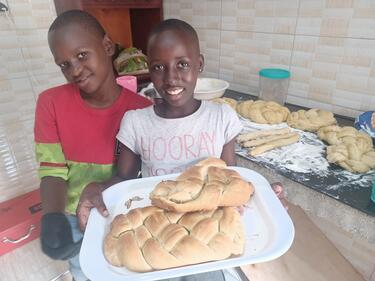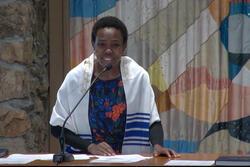7 Questions For Shoshana McKinney Kirya-Ziraba
JWA chats with Shoshana McKinney Kirya-Ziraba, writer and founder of Tikvah Chadasha Uganda.
JWA: You founded the organization Tikvah Chadasha Uganda, which supports disabled children and impoverished women in Eastern Uganda. Tell us more about the incredible work your organization does and what led you to start this work.
Shoshana McKinney Kirya-Ziraba: My husband and I started Tikvah Chadasha Uganda because we realized that impoverished women and the disabled were the most underserved members of society. We work primarily with members of the Jewish community of Uganda, the Abayudaya. We sit in synagogue every Shabbat with our community so the problems aren’t abstract issues; we take our work very seriously. Many of our beneficiaries have all of the challenges of life in rural Africa in addition to dealing with disability.
As an organization, we decided from the beginning that we were going to focus on long-term solutions, which meant we needed to be more strategic. Collaborating with our beneficiaries led to the women’s chicken farm projects, the challah cover knitting circle, the wheelchair exchange, and others.
JWA: Can you share a story about a time when you were able to witness the effects of Tikvah Chadasha Uganda’s efforts?
Toward the end of our Volunteer Day last year, we were just wrapping up a day of art and music and cookies with local disabled children, when it was time for the group photo. Most of the kids we work with use wheelchairs, walkers, or crutches.
All of us were lined-up in rows and tightly packed for the group photo. But then, I noticed a teenage girl crawling on her hands and knees toward the rest of the group. In snarky teenage fashion, some of the kids shouted at her to “hurry up.” My heart sank and I felt such shame, almost like I was on the ground with her. That shame was the spark for our wheelchair program, and we now have kids in North America sponsoring another child’s wheelchair for their bar Mitzvah or bat Mitzvah project.
Having a wheelchair means dignity and independence. I believe that nobody who needs a wheelchair should be without one.
JWA: Your organization centers Jewish values of Tikkun Olam and social justice. How would you encourage people to put these values into practice during their everyday lives?
The Rambam taught us that the highest form of tzedakah is to give someone a livelihood and make it so that the beneficiary no longer needs help.
This is antithetical to the unfortunate way philanthropy to the developing world was presented to me as a kid in the 1990s. A baby-faced blonde actress named Sally Struthers sitting next to a dirty child in rags asked us for 80 cents a day to perpetuate the hand-to-mouth cycle of poverty. Addressing what the family could do together was never part of the equation in the appeal.
Tikvah Chadasha Uganda literally means New Hope for Uganda in Hebrew. We fully believe in the capabilities of our beneficiaries and our focus is on long-term solutions.
JWA: You live in the Jewish community of Uganda and are connected to the first female rabbi from Uganda, Shoshana Nambi. How do Jewish cultural spaces in Uganda compare to those you’ve experienced in the United States?
There is a lot that is the same and there is a lot that is different. We take off our shoes before entering the synagogue closest to Tikvah House as is often the custom in Uganda. Don’t be alarmed if a gecko sneaks into the synagogue.
We have tattered, old prayer books that were printed over 30 years ago. I have been trying to get more and more and more suitcases of prayer books back from America to Uganda, but it’s never enough for all of the synagogues. The Hebrew words of the prayers are the same, but the glorious African melodies really give the service such a joyful and heavenly feeling.
The kids play outside under the big mango tree when they need to take a break from the prayer service. Thanks to the Jewish Solar Challenge, our synagogue is going to finally have consistent electricity for evening programs like community Shabbat dinners, Passover seders and Shavuot evening study.
JWA: After moving to Uganda full-time in 2021, what surprised you the most? Were there unexpected changes that brought you joy?
The amount of peace and tranquility that we have in our tiny village. I’m originally from Los Angeles and I never thought that I could be so happy in such a rural setting. There’s nothing like sitting outside on the veranda with my husband and our son eating veggie omelets and listening to the soothing cooing and chirping of the many birds that live around us. We live on a dirt road where only two or three cars pass in an hour, so the sounds of nature really get a chance to shine.
As an African-American Jew, the racial healing that I have experienced living in Uganda really helped me unpack my experience in America. Being part of a majority in Africa gave me space to heal. I highly recommend it.
JWA: What does a typical Shabbat in Uganda look like?
To prepare, on Thursdays, we go to the farmers market and shops in town since rural areas in Uganda just don’t have big full-service grocery stores the way America does. It’s always bustling and I feel jostled (in a good way) each time.
After getting the fruits and vegetables, we have to go to the animal section to pick up live chickens since our house is strictly kosher. Our local Orthodox rabbi or my father-in-law does the shechitah [ritual slaughtering].
If I’m feeling ambitious, I’ll make challah with my nieces. We have perfected the five-strand braid technique, which is deceptively simple.
Since we're by the equator, Shabbat starts around the same time year-round. We are blessed to have our extended family right next door in a family compound, and so my nephews join my son in singing Shabbat songs until bedtime. Walking to our local village synagogue on Shabbat morning, holding my son’s hand and watching the butterflies bounce between the wildflowers is the best part of the week.
JWA: You're also a fellow writer for the JWA blog! What does JWA mean to you?
JWA is a space for the entire Jewish community to hold and uplift women’s voices and experiences and knowledge and contributions. JWA is unlike any other space because of the mix of secular, religious, and lifestyle content, as well as scholarly work. As a woman of color, with a purposely Jewish voice, being able to write through a gender lens and represent that perspective means so much to me as a writer. In spite of the fact that the Jewish community is supposedly full of “good liberals” there actually aren’t many places in Jewish media to express our views.
Take my article on “supermom” and rabbinical student Hadasah Yaqob-Johnson. JWA is a place for distinctly Jewish women’s stories to thrive!

